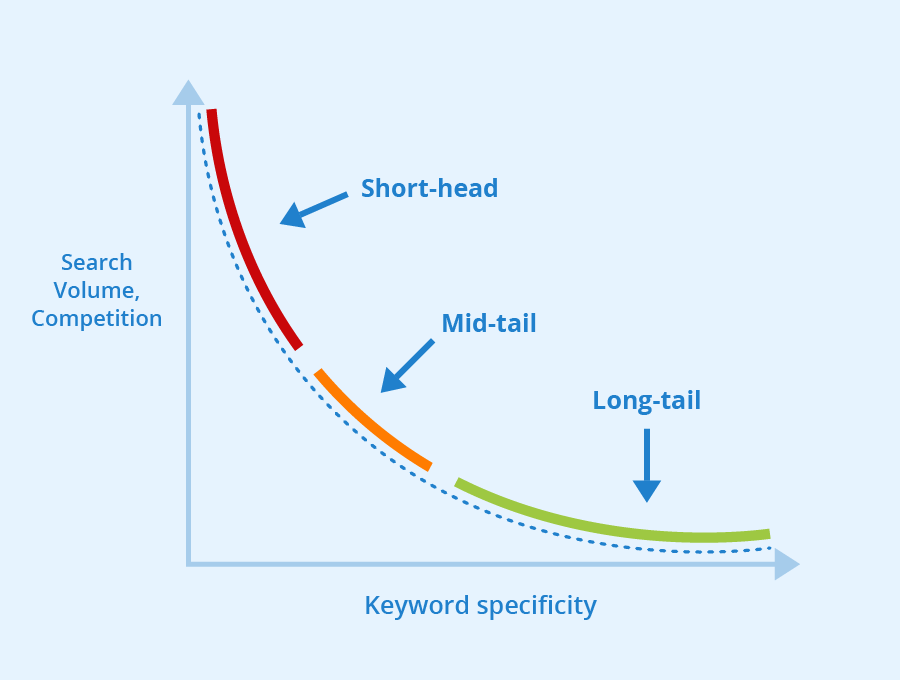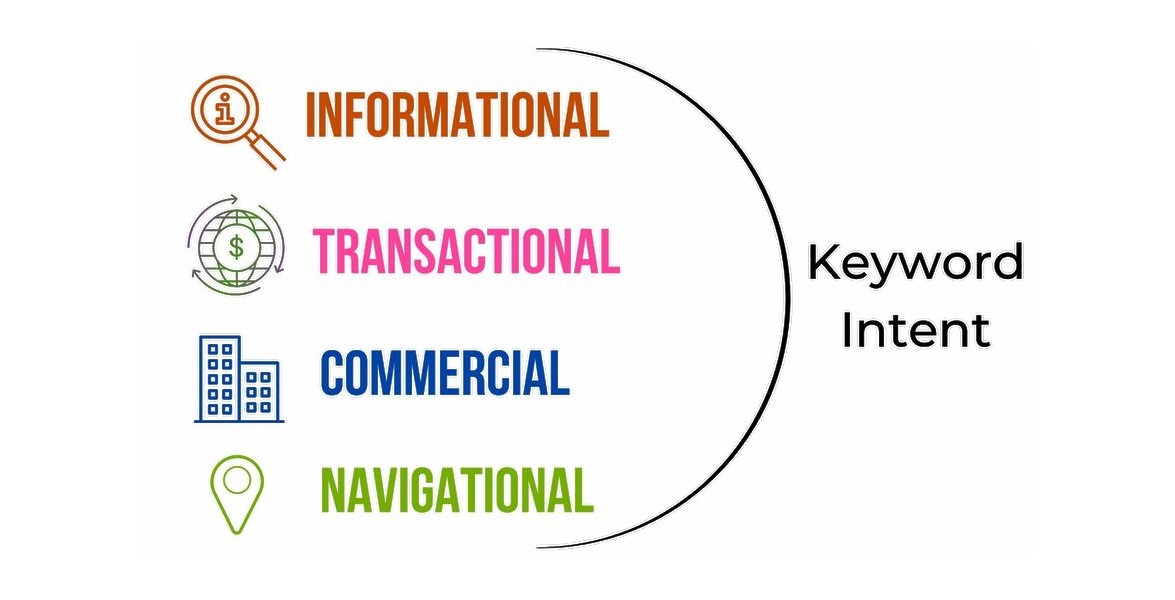Types of SEO Keywords
The method of keyword research is to detect search phrases that drive the right kind of traffic to your website. When people locate your company online, you can convert them from site visitors to leads and, ultimately, to paying clients. However, the first step in this procedure requires a good grasp of SEO keywords. In this article, you will learn about the standard keyword categorization used by SEO specialists. Understanding the various keyword classes can help you focus your SEO efforts more effectively and organically target the most relevant search terms.

Classification of Keywords by Length
Keywords with short tail Head terms, or short-tail keywords, are succinct expressions that usually contain two or fewer words.
1: Short-Tail Keywords
Short-tail keywords (also known as head search terms) are short phrases with no more than two words. People use short-tail keywords to carry out broad searches or explore general information. These are usually going to be the first words that come to your mind. When detailing your business. The same goes for customers; these are the keywords they use at the primary stage of their customer journey. These keywords often have a high search volume and can generate quantities of traffic.
Here are some examples of short-tail keywords:
- Cookies
- AI-powered tool
- Library for kids
- Google algorithms
- SEO tool
Observing a pattern here? Short-tail keywords are highly competitive. So it is generally not recommended to try ranking for them right away. This is particularly true if your business is just starting. Or you have already settled yourself as a guiding authority in your industry.
2: Long-Tail Keywords
The descriptor long tail speaks for itself. Long-tail keywords are highly specific search terms that comprise over three or four words. They commonly have a low search volume but low competition. This makes it simpler to rank for them.

Here are some examples of long-tail keywords:
- Peanut butter cookies recipe with eggs
- Content creation tool for SEO
- Winter dresses to add to your closet for women over 50
- Best school for kids
- History of Google algorithm updates
Since these keywords are more specific. They are commonly more effective at navigating qualified traffic. Let’s say your food blog shows at the top of SERP for the peanut butter cookies recipe without eggs query. You’re way more likely to engage the right audience using this query than if you tried ranking for a short-tail query like peanut butter cookies. People who use long-tail keywords have an easier-to-understand idea of what they assume to find from their search.
And contrasted to short-tail keywords, long-tail keywords have higher modification rates.
Intent Targeting Keywords
Next, keywords can also be grouped conditional on user intent. There are five main keyword classifications based on user intent:
1: Informational
2: Navigational
3: Commercial
4: Transactional
5: Local
let’s review these types of SEO keywords in more detail.
1: Informational Keywords
People use informational keywords to accumulate knowledge. Find answers to their questions, or guide themselves about a topic.
Even though informational keywords have low optimization rates and are generally arduous to rank. Supplying informative content around them helps you initiate authority in your niche and construct trust with your audience. Also, introduce your product/service in a way that communicates the full value of your business. Naturally suggestions customers into the next phase of their buying cycle.
You can classify informational keywords by target like how to, what is, tips former guide
For example:
- How to build a successful business
- What is SEO?
- Tips for improving Websites
- A practical guide to start SEO
2: Navigational Keywords
As a general principle, anyone who tries to reach a targeted website, online store, or social media contour is using navigational keywords. Search terms like these typically consist of an association name, a website, or a product.
Here are some examples of navigational keywords:
- Facebook log in
- Amazon Prime
you do have to be extremely tough to optimize for navigational keywords. Ensure you have all the pages people are observing when they search for or about your brand. From there, it is only a substance of time before Google puts you at the top of SERP for those target queries.
3: Commercial Keywords
Commercial keywords are most constantly used by people with a clear curiosity in making a purchase determination. However, some of these capability customers may not have reached a decision. About what choice works best for them yet? It is unusual for people. Who uses these probes to continue researching the product to fully understand its strengths and negatives?
You can identify these keywords by taking a look at their modifiers.
Some of the most commonly used ones are:
- Best
- Vs
- Review
- Top-rated
- Comparison
.png?1429491201)
Conventional commercial keywords look something like these:
- best web hosting for business
- Spotify vs Apple Music
- top-rated bus seats for infants
- review of vacuum cleaners
- comparison of instant mobile
Ever since commercial keywords indicate that people are beyond the buying journey. Optimization for these search terms distributes businesses a great opportunity to capture valuable leads.
4: Transactional Keywords
This type of keyword is used by people who are ready to make a purchase or take a specialized transactional action (e.g., signing up for an update, downloading an eBook, or any other marketing campaign-related action).
Transactional phrases frequently include words like buy, order, purchase discount, or coupon.
Here are some examples of keywords that include these attributes:
- Buy vinyl records
- Order lab tests online
- Purchase history books
- Woman shows discount
- Movie tickets coupons
The main benefit of intentionally broadcasting transactional keywords throughout your website content (especially landing pages. And product descriptions). That you can substantially increase transition rates. People implementing searches using transactional queries have typically done. All the essential research about the product/service makes them way more likely to Change.
5: Local Keywords
Local keywords are specially linked with the authentic geographic area. Where a consumer is looking for a product, service, or information. These search terms systematically contain locale-specific signs like region/country/state/city names, neighborhoods, zip codes, or even region-specific historical sites
here are some examples of local keywords:
- pet-friendly restaurants in London
- USA live music events
- Dentist near Pinkney Ridge
- Chicago guided tours
Creating high-quality content around local keywords can boost your local search rankings. And get more people upcoming to your store. Plus, local keywords are critical for mobile searches. Which have been on the boost lately. With more people using their phones to observe the places, events, and things near them.

Conclusion
organizing keywords into various groups and then integrating them into your content marketing strategy is key to reaching a broad audience. Optimizing SEO performance, and improving content association
when applicable keyword types are included in relevant content. You obtain a yes response from search engines like Google. And start generating valuable leads.


